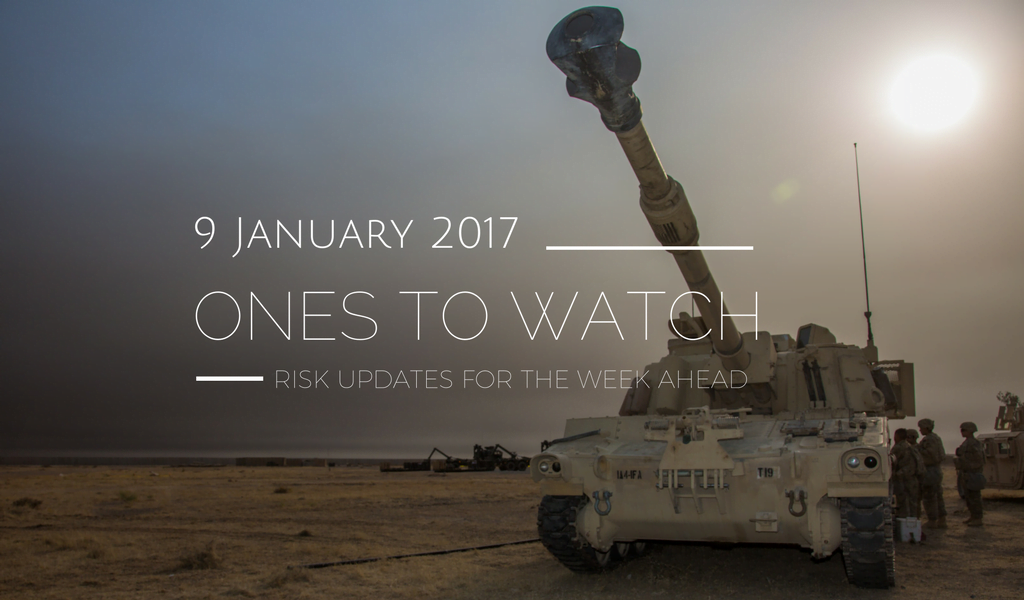Americas: Nicaragua’s President Ortega sworn in for third consecutive term
Sectors: all
Key Risks: policy continuity; economic hardship
In Nicaragua, former Sandinista guerrilla leader Daniel Ortega took office on 10 January for a third consecutive five-year presidential term with his wife, Rosario Murillo, as vice-president. The Ortega-Murillo ticket won 72.5 per cent of the vote in the 6 November general elections amid a historic-low turnout and controversy over the legal elimination of the main opposition group from the vote and the prohibition of election observers. Ortega’s leftist FSLN won 71 of the 92 seats in the National Assembly, which reformed the Constitution in 2014 to allow for indefinite re-election. Ortega is expected to continue to control almost all powers in Nicaragua, which might face increasing economic challenges as aid from Venezuela drops and the US considers a law that could block the country’s access to loans from international lending institutions.
Asia-Pacific: Xi Jinping the new king of Davos
Sectors: all
Key Risks: economic stability
China’s president Xi Jinping will become the first Chinese leader to attend the Davos summit, which is taking place from 17-19 January, and he will look to take the mantle as the global champion of free trade. Xi will argue that globalisation is the key for global development, neglecting to mention that while China has been on an M&A binge acquiring high-tech firms across Europe, foreign firms face a much more difficult environment when trying to conduct business in China. Xi will also call on democracies to resist the rising tide of populism, implicitly praising the relative political stability of China in recent years. Most interesting, however, is the prospect of Xi setting out a model of a Chinese-led global order in which countries are encouraged to leave off governance issues and focus on promoting economic cooperation. While China may play second fiddle in terms of economic importance to the United States for another decade, the distraction of Trump has given Xi the opportunity to set out China’s stall early.
Eurasia: Trump outlines starting points for negotiations with Moscow on sanctions
Sectors: finance; energy; agriculture
Key Risks: sanctions
United States President-elect Donald Trump said he would offer to hold talks with Russia about lifting sanctions in return for an agreement on limiting nuclear weapons. He did criticise Russia’s intervention in Syria and noted he understood European concerns over Russian expansionism, although these will be overshadowed by his questioning of the NATO alliance. Trump’s statements came two days after US President Barack Obama extended economic sanctions on Russia until 7 March 2018. However, Russian officials also indicated Russia’s counter-sanctions barring food and agricultural imports from the West may lapse at year’s end or be lifted early. Putin has invested in expanding Russia’s own nuclear arsenal in recent years but backed the Strategic Arms Reduction Treaty (START) signed between Moscow and Washington in 2010. However, the US Senate has taken a far more hawkish position on Moscow and may require that such a deal also includes new Russian pledges to curb aggressive activity in Ukraine and elsewhere in eastern Europe.
Europe: pound likely to remain volatile ahead of key Brexit developments
Sectors: all
Key Risks: currency stability; frustration of process
The British pound is likely to remain highly volatile over the coming two weeks with a series of major developments on the status of ‘Brexit’ expected. On 17 January, Prime Minister Theresa May is expected to outline her plans for the upcoming negotiations with the European Union and it has already been leaked she will attempt to cast her image for a ‘Global Britain’. That caused concerns that she will seek to take the UK out of the single market and customs union, which sent the pound to below US$1.20 early on 16 January, its lowest since October. The British Supreme Court is also expected to issue its ruling on whether parliament must formally vote to start Article 50. The court could also rule on Northern Irish and Scottish claims that their devolved legislatures must be consulted, which could delay the process significantly.
MENA: Iraqi Special Forces continue sweep across north-west Mosul
Sectors: power and water infrastructure; telecommunications
Key Risks: terrorism; political violence
In Iraq, the operation to retake Mosul University began early on 13 January. The university compound acted as a key base for Islamic State (IS) operations on the city’s eastern bank. A spokesman for the Counter Terrorism Service (CTS) confirmed the CTS had retaken the whole compound from IS fighters late on 15 January, and following a sweep for remaining militants, were going to push on to secure the last few neighbourhoods situated between the compound and the eastern bank of the Tigris. Army bomb disposal units will continue to follow behind, and are expected to take some time to deal with the compound’s extensively booby-trapped buildings. Despite this positive news, IS counter-measures will pose a threat to troops behind the frontline in key neighbourhoods over the next several days.
Sub-Saharan Africa: tensions mount in as President Yahya Jammeh’s mandate due to expire
Sectors: all
Key Risks: political instability; civil unrest; political violence
The Gambia’s political crisis looks set to continue as President Yahya Jammeh attempts to stay in power after his mandate expires on 19 January. The embattled president has sought to obtain a Supreme Court injunction preventing the inauguration from going ahead. Both African Union and ECOWAS heads have stated they will stop considering Jammeh as president after this date, while Nigeria’s parliament voted to offer Jammeh asylum in an attempt to break the impasse. Meanwhile, President-elect Adama Barrow has left for Senegal for fear of his safety. A number of radio stations have been shut down over the past few weeks and any instance of civil unrest after Jammeh’s mandate comes to an end will likely prompt a violent response by security forces. ECOWAS military intervention cannot be ruled out in the absence of a diplomatic solution.



